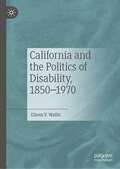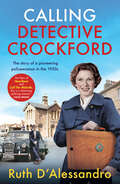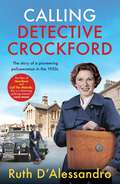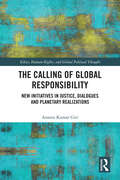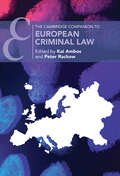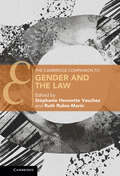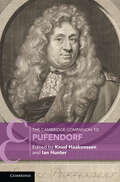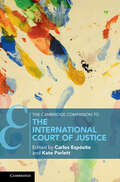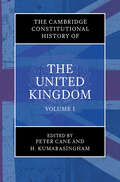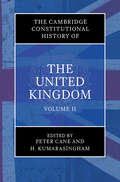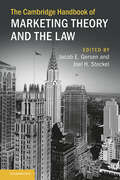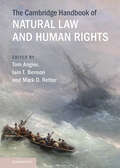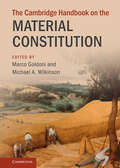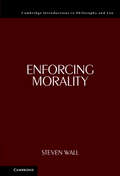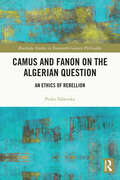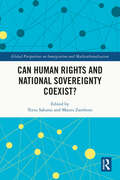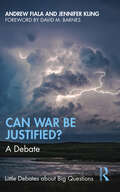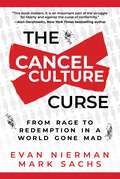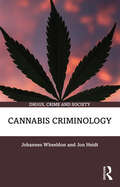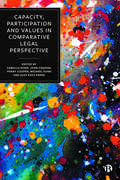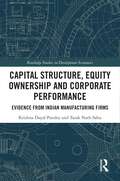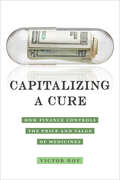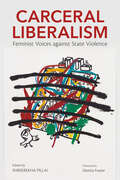- Table View
- List View
California and the Politics of Disability, 1850–1970
by Eileen V. WallisThis book explores the political, legal, medical, and social battles that led to the widespread institutionalization of Californians with disabilities from the gold rush to the 1970s. By the early twentieth century, most American states had specialized facilities dedicated to both the care and the control of individuals with disabilities. Institutions reflect the lived historical experience of many Americans with disabilities in this era. Yet we know relatively little about how such state institutions fit into specific regional, state, or local contexts west of the Mississippi River; how those contexts shaped how institutions evolved over time; or how regional institutions fit into the USA’s contentious history of care and control of Americans with mental and developmental disabilities. This book examines how medical, social, and political arguments that individuals with disabilities needed to be institutionalized became enshrined in state law in California through the creation of a “bureaucracy of disability.” Using Los Angeles County as a case study, the book also considers how the friction between state and county policy in turn influenced the treatment of individuals within such facilities. Furthermore, the book tracks how the mission and methods of such institutions evolved over time, culminating in the 1960s with the birth of the disability rights movement and the complete rewriting of California’s laws on the treatment and rights of Californians with disabilities. This book is a must-read for those interested in the history of California and the American West and for anyone interested in how the intersections of disability, politics, and activism shaped our historical understanding of life for Americans with disabilities.
Calling Detective Crockford: The story of a pioneering policewoman in the 1950s
by Ruth D'AlessandroThis nostalgic and absorbing memoir tells the story of a real-life female police detective in post-war Britain, as she navigates a man's world.It's 1956, and the Berkshire Constabulary has never had a woman detective before. That is, until bright and ambitious WPC Gwen Crockford passes out of Hendon Detective Training School with flying colours...After five years serving as one of Britain's first policewomen, Gwen Crockford becomes one of its first female detectives. Swapping crime prevention for detection, she must soon become comfortable with attending murder scenes and post-mortems, investigating sex crimes and going undercover. Her police work is diverse and challenging: dealing with Teddy boy violence, arson, a paedophile 'war hero', and solving an unexplained death are all part of her remit.Gwen is sharp and quick to learn, considered 'one of the boys' by her colleagues, DS Kinch and DS Le Mercier. Until, that is, the traumatizing death of a child, the arrival of a new sexist DS, and near-zero opportunity for promotion force Gwen to reevaluate her career.Written and researched by Gwen's daughter Ruth from family papers, remembered stories from her mother and contemporary newspapers, this is a fascinating insight into late-1950s society and the challenges faced by female police officers.This is the second book in the Crockford series, following Calling WPC Crockford – Gwen's time as a pioneering uniform policewoman in the early 1950s.
Calling Detective Crockford: The story of a pioneering policewoman in the 1950s
by Ruth D'AlessandroThis nostalgic and absorbing memoir tells the story of a real-life female police detective in post-war Britain, as she navigates a man's world.It's 1956, and the Berkshire Constabulary has never had a woman detective before. That is, until bright and ambitious WPC Gwen Crockford passes out of Hendon Detective Training School with flying colours...After five years serving as one of Britain's first policewomen, Gwen Crockford becomes one of its first female detectives. Swapping crime prevention for detection, she must soon become comfortable with attending murder scenes and post-mortems, investigating sex crimes and going undercover. Her police work is diverse and challenging: dealing with Teddy boy violence, arson, a paedophile 'war hero', and solving an unexplained death are all part of her remit.Gwen is sharp and quick to learn, considered 'one of the boys' by her colleagues, DS Kinch and DS Le Mercier. Until, that is, the traumatizing death of a child, the arrival of a new sexist DS, and near-zero opportunity for promotion force Gwen to reevaluate her career.Written and researched by Gwen's daughter Ruth from family papers, remembered stories from her mother and contemporary newspapers, this is a fascinating insight into late-1950s society and the challenges faced by female police officers.This is the second book in the Crockford series, following Calling WPC Crockford – Gwen's time as a pioneering uniform policewoman in the early 1950s.
Calling Detective Crockford: The story of a pioneering policewoman in the 1950s
by Ruth D'AlessandroThis nostalgic and absorbing memoir tells the story of a real-life female police detective in post-war Britain, as she navigates a man's world.It's 1956, and the Berkshire Constabulary has never had a woman detective before. That is, until bright and ambitious WPC Gwen Crockford passes out of Hendon Detective Training School with flying colours...After five years serving as one of Britain's first policewomen, Gwen Crockford becomes one of its first female detectives. Swapping crime prevention for detection, she must soon become comfortable with attending murder scenes and post-mortems, investigating sex crimes and going undercover. Her police work is diverse and challenging: dealing with Teddy boy violence, arson, a paedophile 'war hero', and solving an unexplained death are all part of her remit.Gwen is sharp and quick to learn, considered 'one of the boys' by her colleagues, DS Kinch and DS Le Mercier. Until, that is, the traumatizing death of a child, the arrival of a new sexist DS, and near-zero opportunity for promotion force Gwen to reevaluate her career.Written and researched by Gwen's daughter Ruth from family papers, remembered stories from her mother and contemporary newspapers, this is a fascinating insight into late-1950s society and the challenges faced by female police officers.This is the second book in the Crockford series, following Calling WPC Crockford – Gwen's time as a pioneering uniform policewoman in the early 1950s.
The Calling of Global Responsibility: New Initiatives in Justice, Dialogues and Planetary Realizations (Ethics, Human Rights and Global Political Thought)
by Ananta Kumar GiriThis book rethinks and transforms the current discourse on globalization and global justice. It expands the idea of globalization from an economic or corporate context to mean humanization and planetary realizations — moving beyond the boundaries of nation-states and other human-made demarcations. The author challenges the notion of human primacy and makes a fervent call to reconfigure the paradigm of anthropocentrism. Through a careful study of movements for justice and inter-faith dialogue from across the world, the book makes a unique contribution to the emerging study of global responsibility. It also helps us overcome our current civilizational crises and cultivate a new civilization of planetary care and co-responsibility. Part of the Ethics, Human Rights and Global Political Thought series, the volume will be of great interest to scholars and researchers of law and society, especially social movements, political theory and philosophy.
The Cambridge Companion to European Criminal Law (Cambridge Companions to Law)
by Kai Ambos Peter RackowEuropean Criminal Law has developed into a complex, jagged subject matter, which at the same time has become increasingly important for everyday criminal law practice. On the one hand, this work aims to do comprehensive justice to the complexity of the matter without sacrificing readability. In order to achieve this, the book's structure enables legal scholars and experienced practitioners to access the information relevant to them in a targeted manner and, at the same time, enables less oriented readers to gain access to European criminal law. Thus, the volume both answers basic questions and offers discussion in more specialised areas. Written by experts in the field, the book offers discussions which are both of the highest academic standards and accessibly readable.
The Cambridge Companion to Gender and the Law (Cambridge Companions to Law)
by Stéphanie Hennette Vauchez Ruth Rubio-MarínTo what extent is the legal subject gendered? Using illustrative examples from a range of jurisdictions and thematically organised chapters, this volume offers a comprehensive consideration of this question. With a systematic, accessible approach, it argues that law and gender work to co-produce the legal subject. Cumulatively, the volume's chapters provide a systematic evaluation of the key facets of the legal subject: the corporeal, the functional and the communal. Exploring aspects of the legal subject from the ways in which it is sexed and sexualised to its national and familial dimensions, this volume develops a complete account of the various processes through which legal orders produce gendered subjects. Across its chapters, each theoretically ambitious in its own right, this volume outlines how the law not only acts on the social world, but genders it.
The Cambridge Companion to Pufendorf (Cambridge Companions to Law)
by Knud Haakonssen Ian HunterIn the same intellectual league as Grotius, Hobbes and Locke, but today less well known, Samuel Pufendorf was an early modern master of political, juridical, historical and theological thought. Trained in an erudite humanism, he brought his copious command of ancient and modern literature to bear on precisely honed arguments designed to engage directly with contemporary political and religious problems. Through his fundamental reconstruction of the discipline of natural law, Pufendorf offered a new rationale for the sovereign territorial state, providing it with non-religious foundations in order to fit it for governance of multi-religious societies and to protect his own Protestant faith. He also drew on his humanist learning to write important political histories, a significant lay theology, and vivid polemics against his many opponents. This volume makes the full scope of his thought and writing accessible to English readers for the first time.
The Cambridge Companion to the International Court of Justice (Cambridge Companions to Law)
by Carlos Espósito Kate ParlettAs international law has become more present in global policy-making, the International Court of Justice (ICJ) has come to occupy an essential and increasingly visible role in international relations. This collection explores substantive developments within the ICJ and offers critical perspectives on its historical and contemporary role. It also examines the growing role of the ICJ in the settlement of international disputes and assesses the impact of the ICJ's jurisprudence on the major areas of international law, from the territorial delimitation to human rights. With contributions from a diverse range of scholars and practitioners, the collection's contents combine a legal perspective with institutional and sociological insights on the functions of the ICJ. By considering the ICJ's character, jurisdiction and effectiveness, this collection offers a varied and holistic account of the International Court of Justice, an institution whose significance and influence only increase by the day.
The Cambridge Constitutional History of the United Kingdom: Volume 1, Exploring the Constitution
by Peter Cane H. KumarasinghamThe Cambridge Constitutional History of the United Kingdom: Volume 2, The Changing Constitution
by Peter Cane H. KumarasinghamThe Cambridge Handbook of Marketing and the Law (Cambridge Law Handbooks)
by Jacob E. Gersen Joel H. SteckelThis handbook examines a wide range of current legal and policy issues at the intersection of marketing and the law. Focusing on legal outcomes that depend on measurements and interpretations of consumer and firm behavior, the chapters explore how consumers form preferences, perceptions, and beliefs, and how marketers influence them. Specific questions include the following: How should trademark litigation be valued and patent damages assessed? What are the challenges in doing so? What divides certain marketing claims between fact and fiction? Can a litigant establish secondary meaning without a survey? How can one extract evidence on consumer behavior with the explosion of social media? This unique volume at the intersection of marketing and the law brings together an international roster of scholars to answer these questions and more.
The Cambridge Handbook of Natural Law and Human Rights (Cambridge Law Handbooks)
by Tom Angier Iain T. Benson Mark D. RetterThis Handbook provides an intellectually rigorous and accessible overview of the relationship between natural law and human rights. It fills a crucial gap in the literature with leading scholarship on the importance of natural law as a philosophical foundation for human rights and its significance for contemporary debates. The themes covered include: the role of natural law thought in the history of human rights; human rights scepticism; the different notions of 'subjective right'; the various foundations for human rights within natural law ethics; the relationship between natural law and human rights in religious traditions; the idea of human dignity; the relation between human rights, political community and law; human rights interpretation; and tensions between human rights law and natural law ethics. This Handbook is an ideal introduction to natural law perspectives on human rights, while also offering a concise summary of scholarly developments in the field.
The Cambridge Handbook on the Material Constitution (Cambridge Law Handbooks)
by Marco Goldoni Michael A. WilkinsonDespite a long and venerable tradition, the material constitution almost disappeared from constitutional scholarship after the Second World War. Its marginalisation saw the rise of a normative and legalistic style in constitutional law that neglected the role of social reality and political economy. This collection not only retrieves the history and development of the concept of the material constitution, but it tests its theoretical and practical relevance in the contemporary world. With essays from a diverse range of contributors, the collection demonstrates that the material constitution speaks to several pressing issues, from the significance of economic development in constitutional orders to questions of constitutional identity. Offering original analyses supported by international case studies, this book develops a new model of constitutional reality, one that informs our understanding of the world in profound ways.
Cambridge Introductions to Philosophy and Law: Enforcing Morality (Cambridge Introductions To Philosophy And Law Ser.)
by Steven WallCamus and Fanon on the Algerian Question: An Ethics of Rebellion (Routledge Studies in Twentieth-Century Philosophy)
by Pedro TabenskyThis is the first book to offer a systematic comparison of the philosophies of Albert Camus and Frantz Fanon. It shows how the ethical, political, and psychological outlooks of these two influential thinkers can further our understandings of how to bring about justice in the face of deep power imbalances. The author foregrounds the bloody Algerian War of Independence in his analysis of the philosophies of Camus and Fanon. Although neither supported French colonial occupation of Algeria, they held radically different views of the conflict. Fanon supported emancipation through violence, which the author argues has been uncritically romanticized. Camus, on the other hand, supported an ethics of moderation that shunned indiscriminate violence. The author argues that Camus has been unfairly accused of being an apologist for colonialism. Finally, the author draws out the common endorsement of humanist values that drive both Camus’ and Fanon’s thought. Camus and Fanon on the Algerian Question will appeal to scholars and advanced students interested in twentieth-century Continental philosophy, postcolonialism, existentialism, and African philosophy.
Can Human Rights and National Sovereignty Coexist? (Global Perspectives on Immigration and Multiculturalisation)
by Tetsu Sakurai Mauro ZamboniLooking at two of the key paradigms of the post-Cold War era–national sovereignty, and human rights – this book examines the possibilities for their reconciliation from a global perspective. The real or imagined fear of a flood of immigrants has caused and fuelled the surge of an amalgam of populist political forces, anti-immigrant movements, and exclusionist nationalism in many developed countries. In the last decade, we have witnessed the emergence of two phenomena in the political and legal spheres. On the one hand, there are liberal globalists asking for respect and the protection of the basic human rights of migrants and asylum seekers and arguing for their civic and social integration into host societies. On the other hand, there are growing calls for a tougher stance on immigration, and powerful populist politicians and governments have emerged in many developed countries. How can the idea of universal human rights survive exclusionist nationalism that uses a populist, unscrupulous approach to its advantage? The contributors to this book explore the meaning of, and possible solutions to, this dilemma using a wide range of approaches and seek appropriate ways of dealing with these normative predicaments shared by many developed societies. Scholars and students of human rights, migration, nationalism and multiculturalism will find this a very valuable resource.
Can War Be Justified?: A Debate (Little Debates about Big Questions)
by Andrew Fiala Jennifer KlingCan war be justified? Pacifists answer that it cannot; they oppose war and advocate for nonviolent alternatives to war. But defenders of just war theory argue that in some circumstances, when the effectiveness of nonviolence is limited, wars can be justified. In this book, two philosophers debate this question, drawing on contemporary scholarship and new developments in thinking about pacifism and just war theory. Andrew Fiala defends the pacifist position, while Jennifer Kling defends just war traditions. Fiala argues that pacifism follows from the awful reality of war and the nonviolent goal of building a more just and peaceful world. Kling argues that war is sometimes justified when it is a last-ditch, necessary effort to defend people and their communities from utter destruction and death. Pulling from global traditions and histories, their debate will captivate anyone who has wondered or worried about the morality of political violence and military force. Topics discussed include ethical questions of self-defense and other-defense, the great analogy between individuals and states, evolving technologies and methods of warfighting, moral injury and post-traumatic stress disorder, broader political and communal issues, and the problem of regional security in a globalizing world. The authors consider cultural and religious issues as well as the fundamental question of moral obligation in a world saturated in military conflict. The book was written in the aftermath of the war on terrorism and includes reflection on lessons learned from the past decades of war, as well as hopes for the future in light of emerging threats in Europe and elsewhere. The book is organized in a user-friendly fashion. Each author presents a self-contained argument, which is followed by a series of responses, replies, and counter-arguments. Throughout, the authors model civil discourse by emphasizing points of agreement and remaining areas of disagreement. The book includes reader-friendly summaries, a glossary of key concepts, and suggestions for further study. All of this will help students and scholars follow the authors’ dialogue so they may develop their own answer to the question of whether war can be justified. Key Features Summarizes the debate between pacifism and just war theory Considers historical and traditional sources as well as contemporary scholarship and applications Models philosophical dialogue and civil discourse, while seeking common ground Discusses issues of concern in contemporary warfighting and peacemaking, while offering an analysis of the war on terrorism
The Cancel Culture Curse: From Rage to Redemption in a World Gone Mad
by Evan Nierman Mark SachsIn a groundbreaking first, cancel culture and its core elements are clearly defined, and a convincing case is made against this fundamentally un-American practice. Cancel culture is an insidious force in society today. In the seconds it takes to make one regrettable social media post—or wind up on the wrong side of a false accusation or misunderstanding—reputations, relationships, and careers are destroyed. Have we entered an era when people cannot make mistakes; where no apology or change of heart can ever deliver forgiveness? Making a comeback used to be a celebrated American ideal. But have the roads to redemption been permanently blocked by internet mobs seeking vengeance? In The Cancel Culture Curse, global crisis manager Evan Nierman and his colleague Mark Sachs examine the impact of cancel culture in today&’s media-driven world. The authors also explore the history of cancel culture and the trends that have fostered it, defining the telltale elements that are hallmarks of such campaigns. Nierman and Sachs provide fascinating case studies and interviews with well-known victims of cancel culture, including philosopher Peter Boghossian, Mumford & Sons cofounder Winston Marshall, and &“San Francisco Karen,&” among others. Also featured, is a playbook for rebounding from public shame, helping readers avoid becoming the latest targets of &“cancel vultures&” who enjoy picking apart the remains of those left to die on the side of the Internet highway.
Cannabis Criminology (Drugs, Crime and Society)
by Johannes Wheeldon Jon HeidtCannabis Criminology explores the prohibition, decriminalization, and liberalization of cannabis policy through the lens of criminological and sociological theory, essential concepts, and cannabis research. It does so by focusing on five thematic areas: law, society, and social control; police and policing; race, ethnicity, and criminalization; the economics of cannabis use; and cannabis use and crime. It is the first book on cannabis since President Joe Biden signed an executive order in 2022 to pardon citizens and lawful permanent residents convicted of simple cannabis possession under federal law and DC statute. Cannabis is now legal in some form in 37 US states. To understand the reform of cannabis policy and the challenges to come, we first need to understand the connections between cannabis and criminology. The book links key areas in past and contemporary cannabis research to criminological and sociological theories, including key concepts, emergent concerns, and new directions. Based on an up-to-date review of this growing area of research, the book outlines a research program based on five essential thematic areas. Introducing cannabis as a critical case study in moral-legal re-negotiation, it outlines how cannabis prohibition has influenced cannabis around the world. Five discrete chapters focus on thematic areas, criminological and sociological theories, define essential concepts, and provide research focused on law, society, and social control (Chapter 2), police and policing cannabis (Chapter 3), race, ethnicity, and criminalization (Chapter 4), the economics of cannabis (Chapter 5), and cannabis and crime (Chapter 6). The book concludes by presenting new ways to engage prohibitionist thinking, by challenging myths, embracing social media, and developing a duty of care to guide future cannabis researchers and explicitly involve people who use cannabis. Cannabis Criminology will be of interest to a variety of readers, including students and scholars from a range of backgrounds studying drug use, drug policy, cannabis legalization, and other drug-related issues. It will also appeal to policymakers who want to know more about cannabis legalization and drug prohibition, those working in the criminal justice system, and social work professionals. Due to its accessible style, people involved in the cannabis industry, as well as cannabis users may also find the book interesting.
Capacity, Participation and Values in Comparative Legal Perspective
by Camillia Kong, John Coggon, Penny Cooper, Michael Dunn andWith contributions from an international team of experts, this collection provides a much-needed international, comparative approach to mental capacity law. The book focuses particularly on exploring substantive commonalities and divergences in normative orientation and practical application embedded in different legal frameworks. It draws together contributions from eleven different jurisdictions across Europe, Asia and the UK and explores what productive or unproductive values and practices currently exist. By providing a detailed comparison of how legal and ethical commitments to persons with disabilities are framed in capacity law across different national systems, the book highlights the values and practices that could lead to changes that better respect persons with disabilities in mental capacity regimes.
Capital Controls and International Economic Law (Cambridge International Trade and Economic Law)
by Bryan MercurioFocusing on capital controls, this study provides rigorous legal analysis to establish whether the mandate of the International Monetary Fund (IMF) extends to the capital account; that is, whether the IMF has the authority to control and/or regulate the use of capital controls by its member states. The book then analyses whether a country's use of capital controls is consistent with the obligations and commitments undertaken in various multilateral and bilateral trade and investment agreements. Finally, it analyses the tension within international economic law, as the IMF now encourages the use of capital controls under certain circumstances, while most trade/investment agreements prohibit or limit their use. Proposing a way forward to alleviate the tension and construct a more harmonious relationship between the norms and standards of finance, trade and investment, this study will be essential reading for policymakers.
Capital Structure, Equity Ownership and Corporate Performance: Evidence from Indian Manufacturing Firms (Routledge Studies in Development Economics)
by Krishna Dayal Pandey Tarak Nath SahuThis book provides empirical insights into the relationship between capital and equity-ownership structure of Indian manufacturing companies and their financial performance. It discusses and analyses the basic theories and concepts associated with capital structure, debt financing, levered and unlevered firms, the various forms of ownership, agency problem and its kind and the exploitation of minority owners by the large and largest owners. The study employs a set of the most reliable and suitable econometric estimation techniques to draw meaningful inferences on the Indian manufacturing sector. The novelty of this book lies in three particular aspects: the depth and dimension with which the topic is addressed; the robust empirical evidence that it has produced and the simple and intelligible approach with which it is authored. It communicates the crucial relevance of corporate capital structure and equity-ownership to the moderation of agency relationship and shaping the internal governance mechanism, which ultimately results in increased or decreased operational efficiency and financial performance. It will enable readers to understand whether an increased amount of debt capital would bring about positive results for firms or create an extra burden on the management of their finances, preventing them from taking productive investment decisions due to the threat of liquidation. The book will find an audience among advanced students, scholars and researchers who are interested in understanding the corporate finance practices and governance mechanism of Indian organizations.
Capitalizing a Cure: How Finance Controls the Price and Value of Medicines
by Victor RoyA free open access ebook is available upon publication. Learn more at www.luminosoa.org.Capitalizing a Cure takes readers into the struggle over a medical breakthrough to investigate the power of finance over business, biomedicine, and public health. When curative treatments for hepatitis C launched in 2013, sticker shock over their prices intensified the global debate over access to new medicines. Weaving historical research with insights from political economy and science and technology studies, Victor Roy demystifies an oft-missed dynamic in this debate: the reach of financialized capitalism into how medicines are made, priced, and valued. Roy’s account moves between public and private labs, Wall Street and corporate board rooms, and public health meetings and health centers to trace the ways in which curative medicines became financial assets dominated by strategies of speculation and extraction at the expense of access and care. Provocative and sobering, this book illuminates the harmful impact of allowing financial markets to determine who heals and who suffers and points to the necessary work of building more equitable futures.
Carceral Liberalism: Feminist Voices against State Violence (Dissident Feminisms)
by Cassandra D Little Shailza Sharma Joanna Eleftheriou Beth Matusoff Merfish Francisco Arguelles Paz y Puente Autumn Elizabeth Zarinah Agnew D Coulombe Tria Blu Wakpa Jennifer Musial Maria F Curtis Marta Romero-Delgado Alka KurianOne of Ms. Magazine's Most Anticipated Books of 2023 Carceral liberalism emerges from the confluence of neoliberalism, carcerality, and patriarchy to construct a powerful ruse disguised as freedom. It waves the feminist flag while keeping most women still at the margins. It speaks of a post-race society while one in three Black men remain incarcerated. It sings the praises of capital while the dispossessed remain mired in debt. Shreerekha Pillai edits essays on carceral liberalism that continue the trajectory of the Combahee River Collective and the many people inspired by its vision of feminist solidarity and radical liberation. Academics, activists, writers, and a formerly incarcerated social worker look at feminist resurgence and resistance within, at the threshold of, and outside state violence; observe and record direct and indirect forms of carcerality sponsored by the state and shaped by state structures, traditions, and actors; and critique carcerality. Acclaimed poets like Honorée Fanonne Jeffers and Solmaz Sharif amplify the volume’s themes in works that bookend each section. Cutting-edge yet historically grounded, Carceral Liberalism examines an American ideological creation that advances imperialism, anti-blackness, capitalism, and patriarchy. Contributors: Maria F. Curtis, Joanna Eleftheriou, Autumn Elizabeth and Zarinah Agnew and D Coulombe, Jeremy Eugene, Demita Frazier, Honorée Fanonne Jeffers, Alka Kurian, Cassandra D. Little, Beth Matusoff Merfish, Francisco Argüelles Paz y Puente, Shreerekha Pillai, Marta Romero-Delgado, Ravi Shankar, Solmaz Sharif, Shailza Sharma, Tria Blu Wakpa and Jennifer Musial, Javier Zamora
